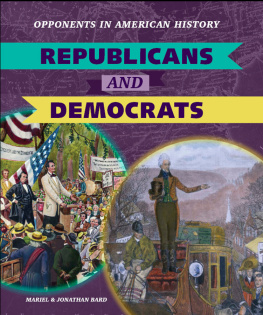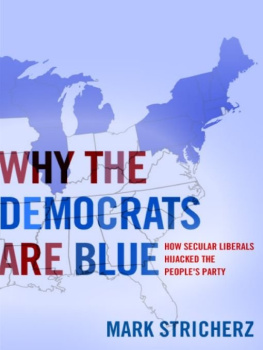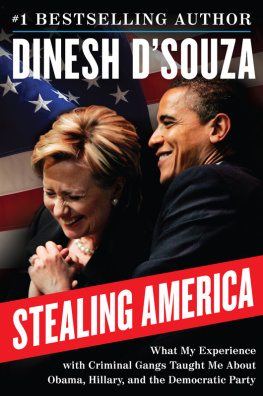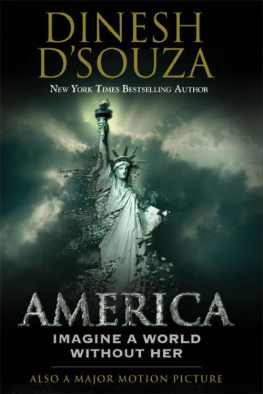Death of a Nation
Plantation Politics and the Making of the Democratic Party
Dinesh DSouza

Thank you for buying this St. Martins Press ebook.
To receive special offers, bonus content, and info on new releases and other great reads, sign up for our newsletters.

Or visit us online at us.macmillan.com/newslettersignup
For email updates on the author, click here.
The author and publisher have provided this e-book to you for your personal use only. You may not make this e-book publicly available in any way. Copyright infringement is against the law. If you believe the copy of this e-book you are reading infringes on the authors copyright, please notify the publisher at: us.macmillanusa.com/piracy .
[Master Thomas] told me, if I would be happy, I must lay out no plans for the future. He said... he would take care of me... and taught me to depend solely upon him for happiness.
Frederick Douglass, Narrative of the Life of Frederick Douglass, an American Slave
To our Gang of Four, who complete our family:
Brandon, Danielle, Justin and Julienna
On Gaining and Losing a Country
To make us love our country, our country ought to be lovely.
Edmund Burke, Reflections on the Revolution in France
A nation is so much more than its laws, its political system, even its founding documents. When I first came to America as an exchange student in 1978, I knew little of the Constitution or the Bill of Rights. What first struck me about America was its people. To me, they were a sort of tribe. As a tribe, they had their own mannerisms and styles of speech, their own customs and cuisine, their own way of life and of looking at the world.
Anthropologists call these folkways. The contemporary word for them is culture. A nation, political scientist Benedict Anderson says, is an imagined community, by which he means a community of people who have never met each other but are linked through their common mores and mutual acceptance of each other as fellow citizens. Such loyalty, Anderson notes, can run very deep in that nations, like religions, are one of the very few things that people are willing to die for. People will die for America but they wont die for the Democratic Party, the Los Angeles Raiders, or the United Way.
Yet in constituting a tribe and having shared traditions and loyalties, Americans are no different from any other people in the world. I suppose if I went to Japan or France I would, in a similar manner, encounter the Japanese tribe, the French tribe. I myself hail from a tribe at the other end of the world, the East Indian tribe. We too have our folkways and culture, which I experienced in my childhood years through watching Bollywood movies, listening to radio broadcasts of cricket games, hanging out of the overcrowded trains on my way to school, eating street bhel puri and jabbering with my friends in that hybrid language of Hindustani and English that can be called Hinglish, and protesting, while submitting to, the corruption that defines the ordinary transactions of Indian life. So we too were a tribe of our own. Yet from my first experience with Americans, I knew they were a unique sort of tribe, a tribe like no other.
In a single year of living with four different families in Arizonaa preacher and his wife; the local postmaster and his wife; a wealthy rancher, his second wife and daughter; and two young schoolteachers with toddlersI experienced America through a series of distinctive rituals. These included my first Rotary dinner during which I stared wide-eyed at my plate, bearing ingredientsnamely, an absurdly large sirloin steak covered with mushroomsI had neither tasted nor seen before; a raucous tailgate party preceding the Patagonia Union High School homecoming game; the abundance of American grocery stores, which had more types of cheese and more types of ice cream than I knew existed; the Sadie Hawkins dance, which included some of my early lifes most memorable embarrassments; and several church potlucks, including one in which a fellow showed me the odd sight of In God We Trust imprinted on his twenty-dollar bill. I remember cheering with my host family at a Little League baseball game; going to malls and restaurants and noticing the funny habit that people have of calling each other sir; seeing the Grand Canyon on an exchange student trip that included several strange signs that said Adopt a Highway; sampling Girl Scout cookies; attending what was at the time described as a shotgun wedding, featuring, incredibly, two students from my senior class; the Sphinxlike college application process, which involved me taking something called a standardized test and asking bewildered friends and family in India to write over-the-top recommendations comparing me to the greatest figures who had ever lived; and waving the flag at the Fourth of July fireworks and cookout.
This, for me, was America, America as I first discovered and experienced it. And this America was fascinating in and of itself. But through these experiencesand by looking underneath themI knew there was a deeper side to America. Who, for example, adopts highways? My mom, visiting years later from Mumbai, could scarcely grasp the concept. It implied a notion of civic engagement, of taking responsibility for something unconnected to ones private sphere, that she found incomprehensibly strange. Featuring God on a nations currency would seem to suggest not merely that trade is expected to be conducted honestly, under Gods supervision, so to speak, but also that the political and economic systems of the country are somehow based on transcendental principles, on the presumption of a divine creator.
The Sadie Hawkins dance, with the girls asking the boys, challenged conventional patriarchal sex roles while, at the same time, affirming the heterosexual norm. Many Indians live in extended families and marry through the intervention and arrangement of parents and relatives; Americans live in nuclear families founded by couples who choose each other and marry after falling in love. Even the poorest, least-educated, lowliest American considers himself just as good as any other American; no one can deny there is a powerful ethic of social equality in a country where people call their waiter sir, as if he were a knight.
Going away to college implied a mobility that expressed itself in phrases like moving up and making it, and wrapped up in all that was the powerful idea of the self-made individual and the self-directed life, in which we are the architects of our own destiny. The American dream is partly about success, but what struck me most about this country was not the spectacular Horatio Alger stories but rather the fact that here even the ordinary guy has a pretty comfortableand by world standards an enviably lavishlife.
Americans are an active people; they are always doing something. In other countries people stand around idle for hours; Americans pursue even recreation with a kind of manic intensity. Americans work hard and play hard. If you pay Americans more they will work more hours; if you pay other people more they will use the money to work less and go on vacation. In other countries it is common to have adults who literally do nothingthey depend on family or friends to take care of thembut ask an American what he does and literally no one will answer, Nothing. I observed that this is a culture of effort and self-reliance; laziness and dependency have a stigma attached to them.
In other countries, a flag is just a flag. But in America, I discovered, the flag is the symbol of a founding event, emerging out of the Revolutionary War that articulated principles that could only be fully expressed almost ninety years later in the aftermath of one of the bloodiest civil wars in history. Other nations are the product of history and chance; America, while hardly capable of eluding history, was primarily the product of design. It is that design that gave rise to an American dream; I noted in my mind that there is no such thing as a French dream, an Indian dream, a Chinese dream.










